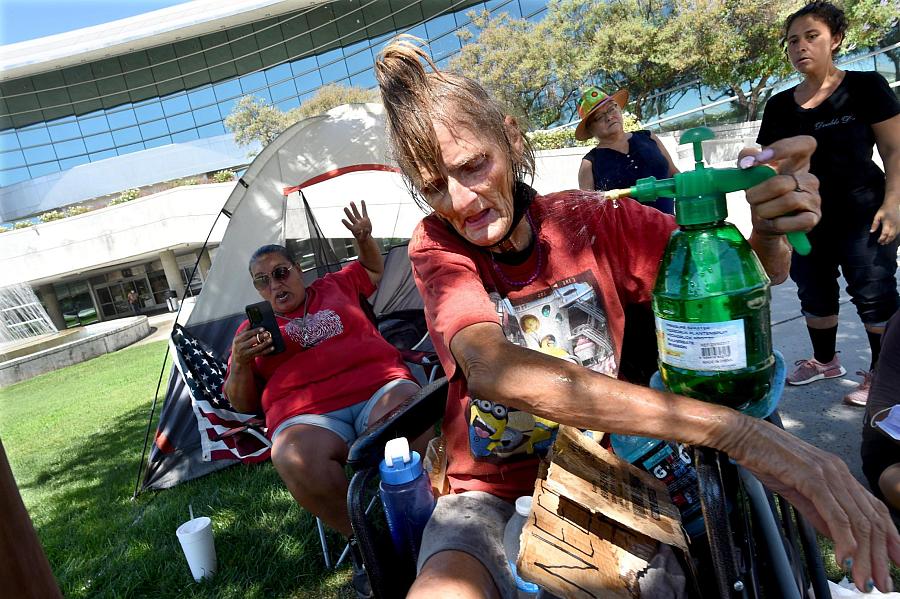What happens when a housing crisis and climate change collide in Fresno County?

58-year-old Shelley Forest, who is homeless and has health issues, uses what she says is the key to survival for her and others on the streets who endure the brutal summer heat in Fresno- a spray bottle of water, as she and others like her and homeless advocates set up camp on the lawn of City Hall, demanding shelter from city leaders, July 20, 2021.
Cassandra Garibay
In 2021, Fresno, California experienced 69 days above 100 degrees, a record for the county.
At the same time, the unhoused population of Fresno and Madera counties rose to roughly 4,000 while skyrocketing rent prices trapped renters in poor living conditions, including broken air conditioning units or none to begin with.
The city of Fresno was also named by the nonprofit Climate Central as one of the top 20 most extreme urban heat islands in the nation, largely attributed to a lack of green space and trees.
Remaining cool and safe during the Central Valley’s summer heat is a concern for both the unhoused and renters who live without air conditioning that works.
In 2006, the Fresno Bee reported that a heat wave resulted in at least 25 deaths and overwhelmed local hospitals and the morgue. Statewide, more than 650 people died that year due to heat-related causes.
Since then, there have been one-off stories about heat-related deaths, but little to no reporting in the Central Valley about how the compounding effects of a mounting housing crisis and prolonged heat spells caused by climate change affect the health of renters and the unhoused.
According to the U.S. Environmental Protection Agency, hot summer temperatures have become more common and “extreme heat events have become more frequent and intense,” which is expected to increase heat-related deaths and illness over time.
Cooling shelters are few and far between in Fresno County’s rural areas and the ones that exist only open once temperatures hit 105 degrees. Many areas, specifically in south, southwest and central Fresno, lack trees, resulting in little to no shade from the grueling sun. And currently, there are no requirements in California for landlords to provide renters with air conditioning, even in areas like Fresno where 18% of the days in 2021 were above 100 degrees.
Despite record-breaking heat, among other climate concerns, the Fresno County Board of Supervisors in March declined to fund a study on the effects of climate change on Central Valley residents.
One supervisor asked the public health officer who proposed the study if the researchers were in “support preserving and expanding agriculture.” Another said they didn’t feel the study was necessary, adding that if people wanted more cooling centers they could just ask.
This series, reported as a project for the 2022 California Fellowship, will shine a light on the gaps in protections for renters inhabiting units without air conditioning and the realities of unhoused community members who do not have access to cooling centers in the Central Valley, as it becomes hotter and hotter for longer and longer.
The articles will examine what has been done elsewhere to protect residents from heat-related illnesses and look at the efforts being made at the state-level to make access to cooling a tenant right through the introduction of Assembly Bill 2597.
And, as I always strive for, the stories will be community driven, seeking to answer the questions and health concerns of those most impacted by heat.

